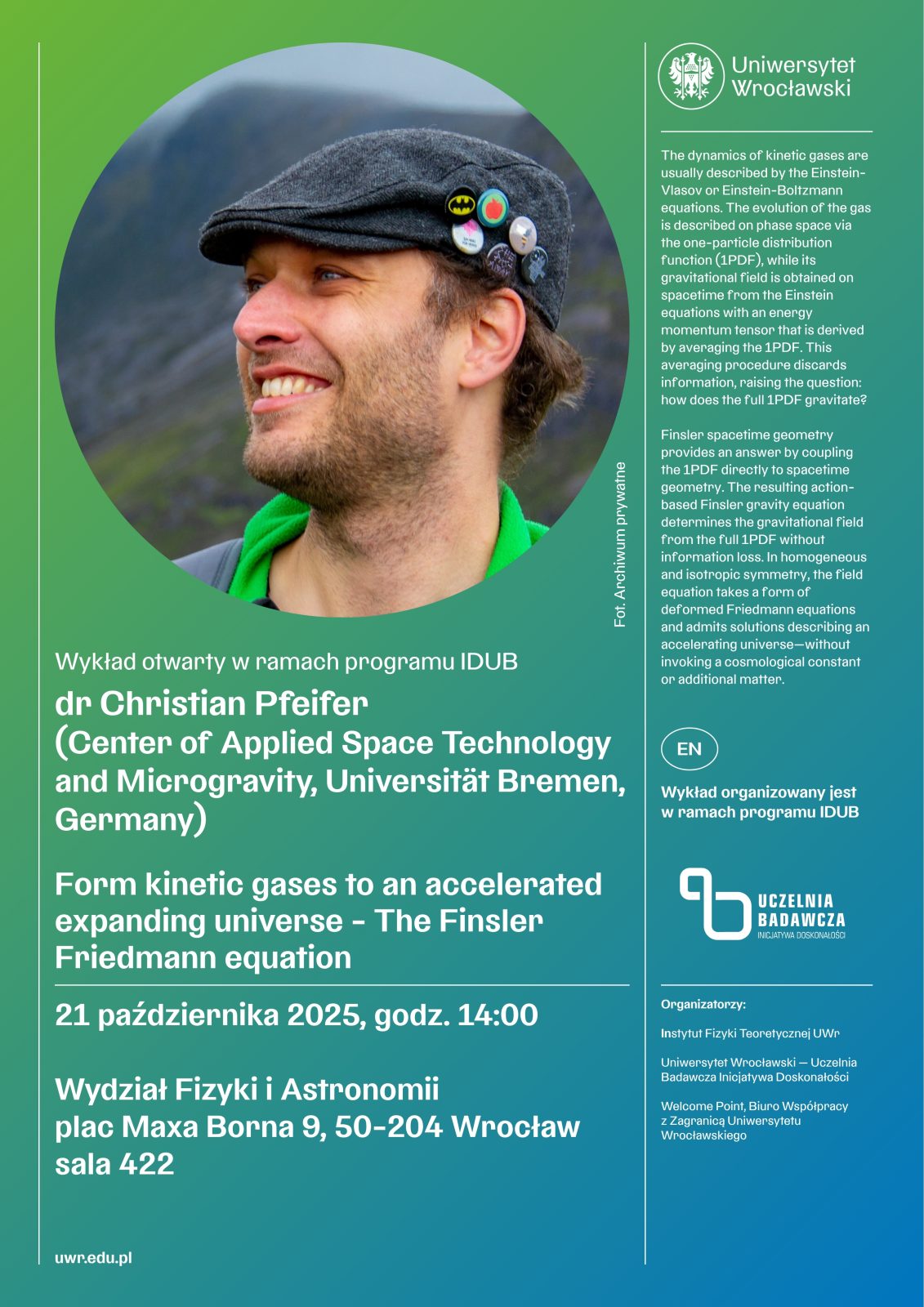
Prof. Christian Pfeifer’s lecture at the Faculty of Physics and Astronomy
Institute of Theoretical Physics of the Faculty of Physics and Astronomy invites for an open lecture of the visiting professor – Dr Christian Pfeifer (ZARM – Center of Applied Space Technology and Microgravity, University of Bremen, Germany) entitled From kinetic gases to an accelerated expanding universe – The Finsler Friedmann equation.
The lecture will take place on 21st October 2025 at 10:15 AM in Room 422 at the Faculty of Physics and Astronomy. The lecture will be given in English.
Prof. Pfeifer is visiting the University of Wrocław from 19th to 25th October 2025 as part of the Visiting Professors programme – IDUB UWr.
Bio
Dr Christian Pfeifer is a Senior Postdoc at the Center of Applied Space Technology and Microgravity (Zarm) of the University of Bremen and visiting professor at the Transilvania University of Brașov in the periods of September-November 2024 and March-April 2025.
His research focuses on the fundamental issues of theoretical physics, especially gravity, the Geometry of space-time and the phenomenology of quantum gravity. He is famous for expanding Einstein’s theory of relativity, using alternative geometrical frames, such as Finsler geometry Hamiltonian geometry and teleparallel Geometry. He published over 80 highly cited scholarly papers, gave over 100 papers, promoted 5 master’s theses, 2 bachelor’s theses and co-promoted 6 PhDs.
Apart from the notable academic achievements, Dr Pfeifer actively organises conferences, schools and academic networks. Since 2017, he has held the cycle of conferences: „Geometric Foundations of Gravity in Tartu”. He organised 2 WE-Heraeus Seminars (2021, 2023), the WE-Heraeus International Winter School on Gravity and Light (2015). What is more, he serves roles of a member: of the Core Group, the Management Committee, and as a leader of working groups within the COST ACTION networks: CA18108 (focused on the phenomenology of quantum gravity, completed in 2023), CA23130 “Bridging High and Low Energies in Search of Quantum Gravity” (launched in 2025), and the upcoming network CA24101 “Testing Fundamental Physics with Seismology” (scheduled to start in late 2025), led by Dr A. Wojnar. Dr Pfeifer’s visit is related to the project mentioned earlier, CA24101, which involves planning academic events and European collaborations. Moreover, PhD Pfeifer is deeply engaged in science popularisation amongst mass public. Since 2022, he has been organising the Summer Academy at the University of Bremen, encouraging youth to study physics and delve into the theory of relativity and space science. He also gave excellent pop science lectures, as part of the conference “Geometric Foundations of Gravity” at the Tartu Old Observatory in 2024 and at Transilvania University of Brașov during his visit.
About the lecture
The dynamics of kinetic gases are usually described by the Einstein-Vlasov or Einstein-Boltzmann equations. The evolution of the gas is described on phase space via the one-particle distribution function (1PDF), while its gravitational field is obtained on spacetime from the Einstein equations with an energy momentum tensor that is derived by averaging the 1PDF. This averaging procedure discards information, raising the question: how does the full 1PDF gravitate?
Finsler spacetime geometry provides an answer by coupling the 1PDF directly to spacetime geometry. The resulting action-based Finsler gravity equation determines the gravitational field from the full 1PDF without information loss. In homogeneous and isotropic symmetry, the field equation takes a form of deformed Friedmann equations and admits solutions describing an accelerating universe—without invoking a cosmological constant or additional matter.
Translated by Amelia Kłaniecka (student of English Studies at the University of Wrocław) as part of the translation practice.

Date of publication: 2.10.2025
Added by: M.K.



